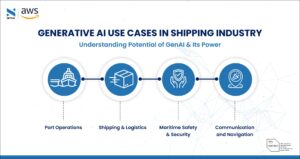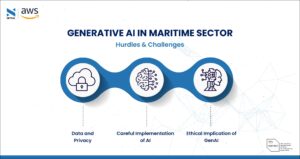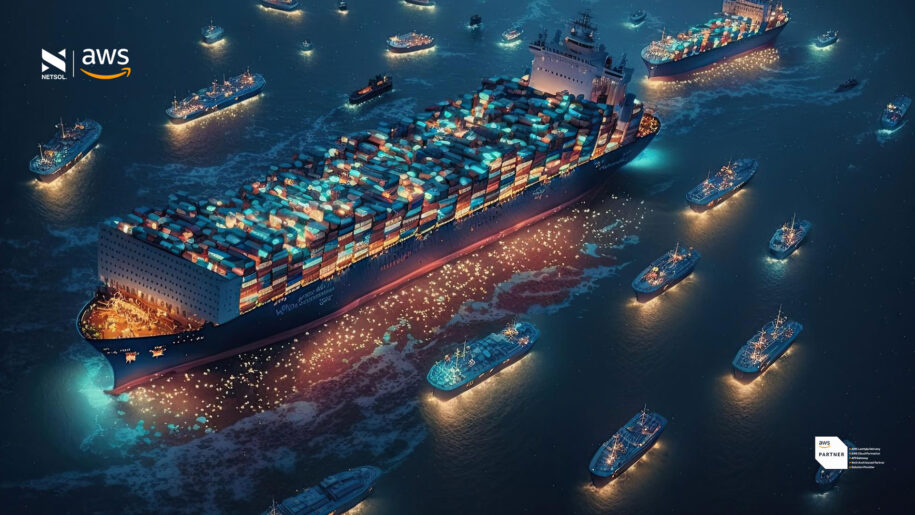The shipping and cruise industries have been associated with adventure, exploration, and luxury for years. They have transported goods across the world’s oceans and provided unforgettable vacations on majestic cruise ships. Recently, there has been a significant shift in these industries towards using advanced technologies to improve operations and customer experiences. One such technology is Generative Artificial Intelligence (AI).
Generative AI is a subset of artificial intelligence that creates data or content instead of just analyzing and processing it. GenAI systems can use algorithms to produce text, images, music, and even entire datasets that mimic human-generated content. GenAI in the shipping industry can potentially revolutionize the maritime sector, from optimizing logistics to personalizing passenger experiences.
So, how does such technology fit in the shipping sector, setting a dynamic future for the cruise industry? Let’s find out!
A Potential Wave of Innovative AI – Generative AI in the Shipping Sector
Generative AI is a game-changer, particularly in the maritime industry. These systems use the data they have been trained on to produce unique and creative content.
The use of Artificial Intelligence in the shipping and cruise industries has already significantly impacted predicting vessel movements, optimizing routes, reducing fuel consumption, and automating equipment maintenance. However, the potential of generative AI is limitless, and it can revolutionize the industry by expanding the capabilities of current AI systems.
Greywing, a maritime intelligence platform based in Singapore, has recently launched SeaGPT, an AI chatbot powered by GPT-4 technology, which enhances communication between crew managers and port agents.
SeaGPT is a powerful information-gathering tool that quickly and accurately collects data, making it an essential tool for crew managers, especially during crew changes, where time is of the essence. It’s an excellent example of GenAI in the shipping industry. It simplifies communication processes for crew managers by automating tasks such as drafting emails and extracting crucial information from port agency replies for specific crew members.
Greywing’s innovative approach to generative AI technology has the potential to transform the cruise industry by enhancing communication and streamlining processes, making a positive impact on the sector.
Streamlining Operations with GenAI-Powered Logistics
The immediate benefit of optimizing logistics and route planning is making Generative AI a powerful tool for the maritime industry’s future. The shipping industry deals with complex ports, vessels, and cargo networks, where even minor efficiency improvements can result in significant cost savings and a reduced environmental impact.
The impact of GenAI in the cruise sector allows the analysis of vast amounts of data, weather conditions, and cargo specifics, suggesting the most effective schedules. Did you know that GenAI can potentially make real-time route adjustments to shipping? This can be done by leveraging multiple factors simultaneously, avoiding adverse weather conditions and congested ports! This ultimately leads to quicker deliveries and reduced fuel consumption, a win-win situation for all parties involved.
Artificial Intelligence in the shipping industry is already predicting maintenance needs, helping shipping companies minimize downtime and reduce maintenance costs. With GenAI in the matrix, they can enhance the analysis of equipment sensor data and historical maintenance records, anticipating when components might fail and scheduling maintenance proactively.
Augmented Safety and Environmental Responsibility
Safety measures are constantly being evaluated and improved as a top priority in the shipping industry. One way in which we can enhance safety is through the implementation of Generative AI. Through GenAI, data from multiple ship sensors, including radar, sonar, and cameras, can be analyzed to identify potential safety hazards and anomalies. This means we can predict possible collisions or adverse weather conditions and alert crew members well in advance, ultimately preventing accidents and saving lives. Something that might have saved the Titanic incident in the past!
But that’s not all! Generative AI can also be crucial in meeting environmental regulations and reducing the industry’s carbon footprint. AI is already helping ships operate more efficiently by optimizing routes and engine operations, thereby reducing fuel consumption and emissions. This step can commit to sustainability and eco-friendly practices when aligned with Generative AI in the shipping sector, ensuring a positive environmental impact.
Personalized Cruising Experience with GenAI
The maritime industry with Generative AI has the potential to revolutionize the sector by providing passengers with highly personalized services. By analyzing passengers’ preferences, past behaviors, and real-time interactions, GenAI can customize onboard experiences to create unforgettable vacations.
Artificial Intelligence in the shipping industry already suggests personalized dining options and plans shore excursions based on individual interests, among other things. With virtual assistants powered by Generative AI, the technology can enhance the guest experience, taking it to the next level. Passengers can use voice or text interfaces to ask questions, make reservations, or get recommendations, making their cruise more enjoyable and hassle-free.
Charting the Course – Use Cases of GenAI Across Maritime Industry
Generative AI has revolutionized the maritime industry by enabling various use cases previously unattainable. The technology has been applied in different industry segments, including shipping, port management, and offshore operations. With the increasing demand for efficiency, safety, and sustainability in the maritime industry, generative AI is set to play a crucial role in shaping its future.

Port Operations
GenAI has the potential to revolutionize the maritime industry by leveraging advanced algorithms and machine learning, optimizing vessel traffic management and berth planning, leading to more efficient and cost-effective operations.
Additionally, the technology can automate container stacking and retrieval processes, reducing the need for manual labor and increasing safety. Furthermore, it can help develop autonomous cranes and vehicles, improving the speed and accuracy of cargo handling operations.
Shipping & Logistics
With the help of generative AI, shipping companies can optimize their routes and vessel speed to reduce costs and improve efficiency. This allows for enhanced cargo tracking and supply chain visibility, helping companies better monitor and manage their shipments.
In addition, with the impact of GenAI in the cruise sector, the industry can expect to reduce fuel consumption and emissions, making it more environmentally sustainable.
Maritime Safety & Security
With the help of Generative AI, it is now possible to prevent and predict vessel accidents more accurately. The technology can also detect suspicious activity, such as piracy and smuggling, and help authorities identify and track illegal fishing activities in real time. By leveraging the power of technology, the Maritime industry with Generative AI can have a better chance to ensure the safety and security of the ocean and its resources.
Communication and Navigation
Designing and developing cutting-edge autonomous vessels and drone ships with GenAI can operate without human intervention is possible. It can enhance the efficiency and accuracy of maritime navigation and communication systems, leading to safer and more secure naval transportation.
The voice-enabled control systems can be created and operated using voice commands, making the process more intuitive and user-friendly. It can also optimize radio frequency spectrum management, improving communication and connectivity between vessels and ports.
Challenges and Considerations
Generative AI in the shipping and cruise industries offers many potential benefits, from optimizing operations to improving safety and enhancing customer experience. However, realizing these benefits requires overcoming significant challenges as well.

Data and Privacy
Ensuring the privacy and security of passenger data is imperative; safeguarding sensitive information is crucial to prevent it from falling into the wrong hands. This includes implementing robust encryption protocols, regularly monitoring systems for potential vulnerabilities, and training employees on best practices for data protection.
Careful Implementation of AI
The development and deployment of AI technologies require a comprehensive infrastructure supporting data processing, storage, and analysis. The shipping sector needs to invest in training its workforce to acquire the necessary skills to work with GenAI systems. This includes training employees on how to use AI tools and methods and how to interpret and analyze data generated by these systems.
Ethical Implication of GenAI
Ensuring that the use of GenAI respects individual privacy and maintains human oversight in critical decision-making processes is essential. The industry needs to take adequate measures to ensure the use of technology is in ethical and responsible hands.
Cruising Towards Better Future
Thanks to generative AI, the shipping and cruise industries are on the brink of a technological revolution. By utilizing the power of GenAI to optimize logistics, enhance safety, and personalize passenger experiences, these industries can improve their operations and sail into a future where sustainability, efficiency, and customer satisfaction are at the forefront.
As GenAI in the shipping industry continues to evolve, the sector must embrace innovation, prioritize ethical considerations, and invest in the necessary technological infrastructure. Get in touch with NETSOL to unlock the full potential of Generative AI and ensure a brighter, more sustainable future for your shipping business.



Leave a Reply